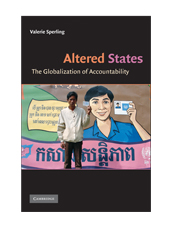Book contents
- Frontmatter
- Contents
- Acknowledgments
- 1 Transnational Institutions and Accountability
- 2 For Richer, for Poorer: Economic Globalization
- 3 Democracy from Abroad? Political Globalization
- 4 Army for Hire: Transnational Military Forces
- 5 Trials and Tribulations: Transnational Judicial Institutions
- 6 My Country Is the Whole World: Transnational Civil Society
- 7 Conclusion: Altered States and Altered Citizens
- Bibliography
- Index
7 - Conclusion: Altered States and Altered Citizens
Published online by Cambridge University Press: 19 January 2010
- Frontmatter
- Contents
- Acknowledgments
- 1 Transnational Institutions and Accountability
- 2 For Richer, for Poorer: Economic Globalization
- 3 Democracy from Abroad? Political Globalization
- 4 Army for Hire: Transnational Military Forces
- 5 Trials and Tribulations: Transnational Judicial Institutions
- 6 My Country Is the Whole World: Transnational Civil Society
- 7 Conclusion: Altered States and Altered Citizens
- Bibliography
- Index
Summary
The preceding chapters tell a sobering tale. In many of its forms, globalization has had detrimental effects on accountability to citizens. Even where transnational forces – primarily transnational social movements and judicial institutions – have had positive effects on governmental accountability, those effects are quite limited, and significant accountability gaps persist. Impunity remains an enormous problem in our national and transnational governing institutions alike.
Under what conditions do transnational forces promote or debilitate governmental accountability? To some extent, the answer revolves around sovereignty. Transnational forces and institutions are destructive to accountability when they constrain a government's autonomy by restricting information and limiting policy choices on issues where the public could otherwise assert itself. In those instances (such as when International Monetary Fund [IMF] agreements controlling economic policy extend beyond the term of the current government, or when private military companies' contracts undergo scrutiny by the executive branch, but not the legislature), transnational institutions limit popular sovereignty as well as state autonomy. By the same token, transnational institutions enhance popular sovereignty when they encourage the expansion of political participation and freedom of information. They may do so by enabling elections, as Executive Outcomes initially helped to do in Sierra Leone, or by fostering human rights education in states with low levels of democratic accountability, as the UN did in Cambodia, or simply by increasing the availability of information about governmental actions and providing more opportunities for informed political participation, especially among marginalized citizens.
- Type
- Chapter
- Information
- Altered StatesThe Globalization of Accountability, pp. 319 - 332Publisher: Cambridge University PressPrint publication year: 2009



